Iowa touted its Covid-19 testing. Now officials are calling for an investigation
The state’s governor awarded a Utah-based company a $26m no-bid contract to run the program, but it has been fraught with complaints
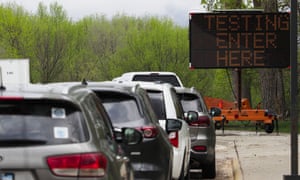
Photograph: Jerry Mennenga/Zuma Wire/Rex/Shutterstock
Iowa is betting on its new public health program to allow for the reopening of businesses such as bars and movie theaters following weeks of Covid-19 closures. But health experts and lawmakers are raising questions about the program and the little-known company behind it, pointing at missed deadlines, long test delays and complaints over the accessibility of testing sites.
The principle behind TestIowa is one familiar to many states and countries by now. Residents participate in a survey that determines whether they qualify for Covid-19 testing; people determined to be at higher risk of having contracted Covid-19 are directed to free testing sites, and positive cases are identified to allow those residents to isolate and curb the spread of the virus.
“Our ability to target the virus down to a zip code means that we can act with precision, to identify and isolate positive cases, track and contain the spread and keep things operating as normal,” Iowa’s governor, Kim Reynolds, told reporters.

To run the program, Reynolds in April signed a $26m no-bid contract with Nomi Health, after being pitched on the company by Ashton Kutcher, the actor-turned-investor who is originally from Iowa. The company bills itself as a general contractor, that helps governments rebuild the testing supply chain and lower costs.
A contentious start
Nomi Health was contracted to have the TestIowa website built and to supply the state with 10 machines for testing and 540,000 coronavirus tests over six months at an eventual rate of 3,000 tests a day. To meet those goals, the company works with partners including departments of health, the national guard and private companies like diagnostic firm Co-Diagnostics and tech firms Qualtrics and Domo. Reynolds said at full capacity the state would be testing 5,000 people a day with TestIowa and other testing capacities combined.
But the program was off to a contentious start.
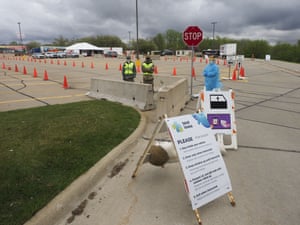
The number of daily tests following TestIowa’s launch on 21 April fell far short of what the governor had promised. Some residents reported their results were lost, marked as “incomplete”, or damaged. Others complained they waited weeks for their results. By 13 May, three weeks after its launch and two days before the state officially started to reopen, TestIowa had sent results to only 4,000 Iowans.
Part of the delays stemmed from checking the accuracy of some of the tests. Utah-based Nomi had also been serving as the general contractor for testing programs in Utah and Nebraska, where some local reports cast doubt on the accuracy of testing. Iowa, before using Nomi-contracted testing, cross-checked results through its State Hygienic Laboratory. But until the TestIowa machines were vetted, Covid-19 samples had to be processed at Iowa’s State Hygienic Lab, causing more delays.
Vetting was completed by 14 May and, according to the governor, showed 95% accuracy for determining positive results and 99.7% for determining negative results.
A spokeswoman from Nomi health said the company does not “collect, process, or provide clinical advice on test results” and that sample collection, test administration and processing of tests are all carried out by its partners.
Co-Diagnostics develops and manufactures the Covid-19 molecular diagnostics that Nomi uses, in addition to tests for other infectious diseases. It does not, according to its spokeswoman, collect, process or retain test data. Co-Diagnostics’ Covid-19 test has received emergency use authorization from the FDA.
“The accuracy of Co-Diagnostics’ test has been demonstrated time and again in independent third party evaluations, including the recent validation in Iowa,” Co-diagnostics told the Guardian in a statement. “The company continues to be surprised by reports that ignore this data and that parrot ‘concerns’ that were originally raised by a competitor and published by the Salt Lake Tribune.”
Additional concerns
Meanwhile, public health experts raised concerns about the design of the TestIowa portal, and accessibility of the testing sites. “I have taken the TestIowa assessment and I felt as though the questions were designed by analysts and not people with expertise on infectious disease,” said Lina Tucker Reinders, executive director at the Iowa public health association. The way the program is constructed, she argued, “could result in or exacerbate inequities”.
Nomi Health refutes these allegations and indicates that it collaborated with “leading medical experts” to create the assessment.
Tucker Reinders pointed out that the platform’s accessibility is affected by internet access – in a state with known broadband access issues, especially in rural areas. Only about 65% of Iowa’s 216,007 census blocks have access to broadband internet at speeds of at least 25 mbps download and 3 mbps upload, according to 2019 data.
“If someone doesn’t own a computer, tablet or mobile phone with internet connection, they cannot access the TestIowa site independently,” she said. “They are advised to have a family member or friend help them enter their data. This is inappropriate because the assessment asks personal medical information.”
In addition, the platform is only offered in English and Spanish, making it inaccessible to speakers of other languages common in the factories where Covid-19 is most prevalent in Iowa, where immigrants from Mexico, Bosnia and Burma work.
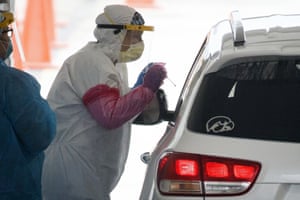
And residents have complained that the program’s eight drive-through testing sites are hard to access by public transportation and are only open certain hours, mostly weekdays and during day time. Some Iowans have found their closest testing site is hours away.
A spokesman for the governor said “the program also works directly with employers to overcome language barriers that exist” for people who do not speak Spanish or English, and that TestIowa is just one tool individuals can use to get a Covid-19 test. “That being said, we have made significant improvements in this area and the governor has been a champion for expanding broadband access, especially in rural communities,” the spokesman added.
Calls for an investigation
Some health experts in the state have questioned the government’s decision to award the testing contract to an out-of-state company. “The expertise of Nomi Health and their partners appear to be in the fields of data analytics and engineering, which are not the same as epidemiology,” said Tucker Reinders.
To Rossana Rosa, an infectious disease specialist based in Des Moines, it’s clear when looking at the TestIowa platform that it was not made in partnership with the existing public health framework in Iowa. “Of course we welcome any effort to expand testing in Iowa,” she said. “But this is a web-based platform without any relationship or integration with any of the healthcare systems. Patients get a lot of the burden of interpreting a test result or knowing what to do once they get it.”
“I was surprised by the fact that instead of utilizing established public health entities, we went to a company that has never been involved in diagnostics before,” said Megan Srinivas, an infectious disease physician at the University of North Carolina’s Institute of Global Health and Infectious Diseases. “It is unusual to do in the setting of a pandemic when we really want to use resources that are reliable.”
A Nomi Health spokeswoman disputed the suggestion that the company lacked expertise, and said its co-founder and COO, Josh Walker, had more than 20 years of healthcare experience and the company has partnered with hospital systems, leading disease detection technologies, and other established healthcare entities.
“While Nomi Health may be a new company, our partners executing on these testing programs are not,” she said.
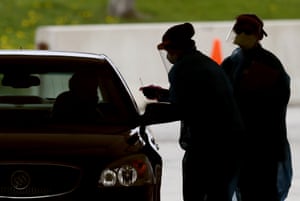
Iowa lawmakers, however, are calling for an investigation. “It’s clear that TestIowa failed to meet the goals outlined by Governor Reynolds. Iowa taxpayers are on the hook for $26m and they deserve to know whether their money is being spent wisely,” representatives Ruth Ann Gaines and Chris Hall said in a letter last week calling for a government oversight investigation.
“We trust what Iowans and local officials are communicating about their experiences with TestIowa. If Iowans can’t get the answers they deserve regarding TestIowa, it may be time to cancel the contract,” said the letter.
Lawmakers are also concerned about the lack of transparency around how the TestIowa contract got awarded. A spokesman for the governor said decision was made in coordination with the Iowa department of public health and the state medical director and epidemiologist. He said Reynolds also spoke with the Utah governor, Gary Herbert, and his staff regarding its parallel program, TestUtah, before making her decision.
Lawmakers in other states where Nomi Health is operating have called for similar reviews. In Utah, disease specialists have questioned the company’s results after data showed far lower positive rates than those of other providers.
And in Nebraska, the Journal Star reported the TestNebraska initiative results were showing a 2% positive rate, which is “well below the 18% average positive rate for all other tests conducted in Nebraska since testing began in early March”.
Nebraska lawmakers have asked the state’s governorto terminate the $27m contract with Nomi, saying the company has no prior experience with epidemiology. “Perhaps not the best entity to be dealing with this massive project, considering they aren’t a healthcare company and they admittedly don’t know anything about lab testing prior to March of this year,” the Nebraska state senator Machaela Cavanaugh wrote.
Nomi Health said it was “unfortunate” that “some politicians have decided to use their positions to target a community health program run by the state to serve their own political agendas in the midst of a crisis, instead of directing their energy toward taking meaningful action to help the State’s COVID-19 response”.
“It’s also clear these politicians don’t understand our role or what it takes to pull together an effective testing operation like this so quickly with no defined playbook,” the company added.
A Nomi spokeswoman said the backlog of results in Iowa has been resolved and were a normal part of the program ramping up its capabilities during a health crisis. “It is a herculean effort to launch a state-wide assessment and testing program in record time in the midst of a pandemic with no precedent for doing so,” she said.
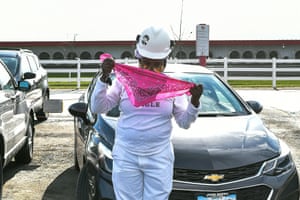
Where TestIowa stands
Despite the widespread concerns, Reynolds is moving forward with TestIowa, saying the state is approaching its original goal of 5,000 daily tests. But some Iowans say they are still having trouble getting results.
Meanwhile, Iowa is one of the fastest-growing states for cases of coronavirus, fueled in part by spikes at meatpacking plants where hundreds of mostly immigrant workers have fallen ill. Nearly 60% of employees at one Tyson plant in Perry, Iowa – 730 employees – reportedly were infected with the virus. Another Tyson plant, in Waterloo, Iowa, had 1,031 reported cases among about 2,800 workers.
An additional outbreak was revealed in a news conference in May in Storm Lake where 555 of the plant’s 2,517 employees have tested positive.
In that announcement, the Iowa department of public health said it would not be publicly announcing continuing outbreaks at meatpacking plants unless directly asked by reporters. The Iowa department of public health and the governor’s office declined to respond to questions about the number of coronavirus hotspots in the state, and whether those would be tracked by TestIowa.



